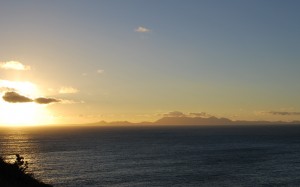CHAPTER < NINE CONTD - RETHINKING BASIC ASSUMPTIONS
 Since the 17th Century when the telescope was invented and sunspots were first observed, these impressive displays of extraterrestrial temperament have continued to fascinate astronomers. However above and beyond this visual fascination, sunspots and solar flares with their violent solar winds of high-speed electrically charged particles, are believed to cause and affect many diverse phenomena on our planet; from disturbances of Earth’s magnetism to episodes of influenza pandemics which have been found to correlate with cycles of intense sunspot activity.
Since the 17th Century when the telescope was invented and sunspots were first observed, these impressive displays of extraterrestrial temperament have continued to fascinate astronomers. However above and beyond this visual fascination, sunspots and solar flares with their violent solar winds of high-speed electrically charged particles, are believed to cause and affect many diverse phenomena on our planet; from disturbances of Earth’s magnetism to episodes of influenza pandemics which have been found to correlate with cycles of intense sunspot activity.
Solar flares increase negative ionization on Earth and this increase in negative ions affects human beings, seeming to exaggerate erratic behaviour, which could be borne out by the fact that an increase in admissions to mental hospitals has been linked to the occurrence of solar flares and that, many wars, revolutions, rebellions and riots have taken place during periods of maximum sunspot activity.
In the last century alone, major events such as World War One, the Russian Revolution, World War Two, mass civil disobedience in India, the Korean War, the Falklands War, the Chinese Student uprising, the fall of the Berlin Wall, the end of apartheid in South Africa, the disruption of the peace treaty in Northern Ireland and the renewed fighting between Palestinians and Israelis, have all coincided with periods of sunspot maxima.
 Control over the environment within which we live is merely illusory. The little control that we have is dependent on a number of interrelated factors, most of which are beyond our ability to affect. The truth is that we are at the mercy of the elements of the land, sea, sky, and solar system. Powerful magnetic storms; earthquakes that crack open the ground destroying buildings, bridges and road works; mudslides that slice off a side of a mountain; avalanches that envelop everything in their headlong downhill rush; volcanoes that spew out the molten insides of the globe; tsunami waves that race along the surface of the sea to finally crash onto the shore: these are all natural phenomena that are beyond our ability to control. They are dramatic reminders that we are but travelers in time and space, guests of the planet Earth and not its masters.
Control over the environment within which we live is merely illusory. The little control that we have is dependent on a number of interrelated factors, most of which are beyond our ability to affect. The truth is that we are at the mercy of the elements of the land, sea, sky, and solar system. Powerful magnetic storms; earthquakes that crack open the ground destroying buildings, bridges and road works; mudslides that slice off a side of a mountain; avalanches that envelop everything in their headlong downhill rush; volcanoes that spew out the molten insides of the globe; tsunami waves that race along the surface of the sea to finally crash onto the shore: these are all natural phenomena that are beyond our ability to control. They are dramatic reminders that we are but travelers in time and space, guests of the planet Earth and not its masters.
If It Doesn’t Work Out We Can Always Leave
When the Apollo 11 Mission reached the Moon’s Sea of Tranquility on 20 July 1969, the images that the spacecraft sent back to Earth captured the imagination of people everywhere. Everyone old enough to understand the magnitude of what had been achieved and privileged enough to see the first moonprint and other iconic images that were flashed across television screens and printed in newspapers, marveled at the brilliance and audacity that had resulted in the first lunar walk by previously earthbound human beings.
It was a defining moment in the history of humanity because for the first time we were able to see the Moon, not as we had always seen it, as a far-off mysteriously beautiful silver orb or crescent that hung suspended in our night sky, but close-up as a dusty grey planet, pitted and pockmarked from its battering by other celestial bodies. Perhaps these media images, anchored as they were in the brash authenticity of modern technology, took away much of the romance that had always been associated with the Moon. But for us on Earth, the compensation for this loss of moonstruck romanticism was the images flashed back from outer space of our own planet.
For what these images enabled us to see for the first time, was an exquisite blue and white sphere shimmering with radiance against the vast dense blackness of outer space. And what a sight it was. If we had thought that the Moon from afar was breathtaking, what we learned more than 30 years ago was that lunar brightness was a poor comparison to the matchless incandescence of our own sunlit blue and white planet. What those images also unequivocally brought home to us was the vulnerability of our world as it spun in silent solitude through deep space. With this understanding came a perception about our own vulnerability, because we realised that for the time being there is nowhere else to go. This planet is it. This is all we have for now. Earth is home. Interplanetary exploration continues to reinforce this perception because since the first pioneering interplanetary flight, our spacecraft have orbited, passed by or landed on more than 70 new worlds, none of which have been habitable.
What those images also unequivocally brought home to us was the vulnerability of our world as it spun in silent solitude through deep space. With this understanding came a perception about our own vulnerability, because we realised that for the time being there is nowhere else to go. This planet is it. This is all we have for now. Earth is home. Interplanetary exploration continues to reinforce this perception because since the first pioneering interplanetary flight, our spacecraft have orbited, passed by or landed on more than 70 new worlds, none of which have been habitable.
And so the outcome of Cold War nationalism, which led to the first man from Earth walking and setting a United States flag upon the Moon, was surprising. Because quite apart from lunar exploration and superpower one-up-man-ship, it led to the unexpected unification of humankind in the realisation of our interdependence. Perhaps for the first time in human history we realised that there is more at stake here than selfish national interest. Or perhaps this is a lesson that the ancients knew well but one that was forgotten over time and one that we have had to relearn?
 Perhaps the words on the plaque that the astronauts set upon the Moon that read, “Here men from the planet Earth first set foot upon the moon, July 1969 AD. We came in peace for all mankind.” were more prophetic than we had then realised. Now we know them to be true. The achievement of the goal of lunar landing by three men from the United States represented an achievement for all of humanity.
Perhaps the words on the plaque that the astronauts set upon the Moon that read, “Here men from the planet Earth first set foot upon the moon, July 1969 AD. We came in peace for all mankind.” were more prophetic than we had then realised. Now we know them to be true. The achievement of the goal of lunar landing by three men from the United States represented an achievement for all of humanity.
Conversely, in the same way that the positive actions of some can benefit all, the negligent or destructive actions of some nations and some corporations and some people also have the potential to adversely affect us all. For good or bad we are all in this life on Earth together and for the meantime at least, there is nowhere else for us to go. His Holiness the 14th Dalai Lama has said, “We must make this new century a century of peace and dialogue”.
Today’s world cannot withstand another World War or Hiroshima with its devastating nuclear consequences. The stakes have risen far too high. With excessive firepower at our command, it has become too easy for global or even regional conflict to escalate until it tips the balance of our entire civilisation and the natural world on which we depend, into a black hole of no return.
For this reason it is imperative that responsible and level-headed leadership at every level of government and non-governmental institution prevails and that we learn to get along, putting aside cultural, ideological, financial and other differences in the goal of the global common good. And failing this, if retaliatory acts of aggression are inevitable in order to maintain national security and pride that we negotiate through neutral parties the means of conflict from a long-term perspective, keeping in mind that the effects of today’s confrontations could make the world uninhabitable for our own and generations still to come…